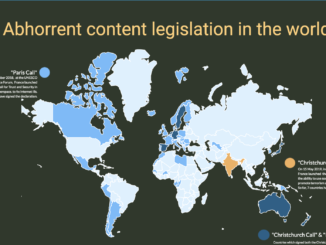
Newly passed social media law may have little enforceability thus lack effectiveness and legal effect.
This comment piece will be based on the Criminal Code Amendment (Sharing of Abhorrent Violent Material) Act 2019 passed by Australian Parliament on 3rd, April, to analyse its enforceability through ethical, technical, and implementation levels and make the argument that the new law has little enforceability under the current circumstance thus makes its effectiveness and legal effect uncertain.

Story:
The law defines new offenses and liability, including 3 years’ imprisonment or fines up to 10% of the platform’s annual turnover for internet servicer or social media platforms failing to remove “abhorrent violent material expeditiously”, and fines up to A$168,000 for an individual or A$840,000 for a corporation for failing to notify the police if the violent content happening in Australia is streamed on their platform. This is aimed at preventing the “weaponization of social media platforms” in the wake of Christchurch attack. However, it aroused a heated debate these days including the inquiry on legislative process and possible consequences.
The comment piece will analyse the law in a new perspective, the enforceability. The whole article will be divided into five parts, starting with the introduction of the new law. The next part will argue that the law is not ethically applicable because of the inappropriate shifting of responsibility from government to social media platforms. Then the article will explain the current technical challenges in terms of content moderation for videos based on Facebooks’ tools and Microsoft’s Content Moderator API. The following emphasis will be put on the implementation of the law focusing on its ambiguity and inoperable issues such as lack of financial support plan in the law and extensive human and material resources needed. Last part is for conclusion.
Sources of Information:
The source of information will mainly be two parts: researches on the content moderation and Australian laws; and interviews with experts. The Human Cost of Online Content Moderation by Andrew Arsht and Daniel Etcovitch (2018), CMO’s comment, and Robert Merkel’s Livestreaming terror is abhorrent – but is more rushed legislation the answer? will be main sources. As for the interviewees, Arthur Moses, the president of the Law Council of Australia will be interviewed first for the general comments to the law and references of potential challenges in the law implementation. Then Yann LeCun, VP and chief scientist of Facebook will be interviewed, if possible, to represent technical experts to provide information in terms of technologies involved in the law and current technical level. Evelyn Douek who is S.J.D candidate of Harvard Law School, clerked for the Chief Justice of the High Court of Australia, the Hon and recently studied on the Australian new law, will also be interviewed for the opinion over the distribution of responsibilities between the government and social media platforms.
Targeted Audiences and Platforms:
The comment piece can be published on the online journalism focusing on opinions and comments such as The Conversation, targeting on the social media workers, politicians and people who cares about the new law. The article is important for its timing of discussion and public hearing on the new law, and the significance to all social media platforms.
Ideas for Multimedia:
The video and images of interviews will be presented in the comment piece. Meanwhile, maps showing the influence area of social media platforms and how many social media companies in Australia will be provided to illustrate difficulties in implementing the law.



Be the first to comment